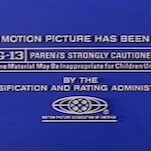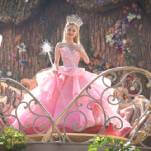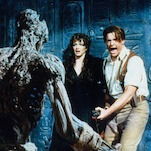Quick, name a great filmmaker who spent a lot of time feuding with critics. I’m not talking about a dust-up here or there, but someone who took on critics categorically. No, I can’t think of one either. Michael Bay has nothing kind to say about critics, but I’m not sure he counts. Neither, as of late, does Kevin Smith, who went on a long tirade on Twitter a couple of nights ago, a screed CHUD’s Devin Faraci wrangled into chronological order. Here’s a sampling:
Smith goes on to declare that his films will no longer be screened for free for critics:
I’m not going to attempt to parse the logic of either chunk. Okay, maybe I’ll try a little. Is Cop Out like a developmentally disabled child because it didn’t turn out the way Smith planned? Or is it a film aimed so low that it should be beneath criticism? I have yet to see Cop Out, but I think it’s supposed to be a comedy. I doubt any worthwhile critic would have given it a bad review if the laughs were there.
As to the other chunk, Smith is just the latest to pile on film criticism, a profession whose death gets pronounced on a weekly basis. Not that there aren’t signs we’re in trouble. The cancellation of the excellent Michael Phillips and A.O. Scott-fronted At The Movies is not good news. But it’s not the end and critics aren’t going away.
I think the function of criticism has gotten confused over the years. Smith seems to think it’s a lot more personal that it is, that critics wait with knives sharpened to settle scores. Here’s the best description I’ve read recently, courtesy of longtime film writer (and sometime filmmaker) F.X. Feeney (and found in the comments section of Jeffrey Wells’ Hollywood Elsewhere site):
Film Criticism at its best is nothing more or less than the practice of literature. A humble corner of literature, to be sure — but talent, depth of comprehension and communication are the arbiters of what’s good and true. They always were, always will be. The topic is fleeting, and today’s insight wraps tomorrow’s fish, but the abiding joy comes of saying what you’ve experienced so truthfully and so well that strangers get your meaning whether they agree or not.
Or put another way, here’s what A.O. Scott posted to Twitter, as I was writing this: “Onward. There are movies out there that need reviewing! Bad ideas that need refuting. Criticism is not a job. It's a way of life.”
We’re not bullies and we’re not, though this sometimes gets forgotten, consumer guides. We're writers who think what we write about matters. And while critics are certainly not above getting in absolutely insane personal tangles with filmmakers, that doesn’t happen too often, nor should it.
Here’s a possible solution: Critics should start ignoring Kevin Smith. Not the filmmaker—I think he might still have some good movies in him—but the public personality. I know I have, at least as much as possible. And I’ve had to. In 2001, Smith released a movie called Jay And Silent Bob Strike Back. It wasn’t, to my eyes, very good. I hadn’t loved Clerks the first time I saw it, but it had grown on me. I largely liked Mallrats and Chasing Amy and thought Dogma had a lot of interesting ideas but didn’t really work. Jay And Silent Bob, on the other hand, was a self-indulgent mess. I saw it with Scott Tobias, whose opinion was more or less in line with mine. Scott wrote a review saying as much.
At the same time, I was scheduled to interview Smith, which I looked forward to doing. Even if I didn’t like this particular movie, I thought Smith was an interesting guy and an engaging interview. (I’d talked him before around the time of Chasing Amy.) To conduct said interview meant driving out to the suburbs, where Smith was appearing at a comic book convention, on a Sunday. Not my first choice, but whatever. Duty calls. That Sunday morning I get a call telling me my one on one interview with Smith has been switched to a roundtable, meaning I’ll be sharing my time with one or more other journalists. I decline to participate. For the Q&A-style interviews we do, we can’t possibly get what we need in a roundtable. If that’s the only option, we have no choice but to say no, it doesn’t matter who you are.
I didn’t think that much more of it. I had wanted to talk to Smith, but we had other options for the paper and (then much more modest) website at the time. A week or so goes by. Our review runs. Then someone points me to Smith’s site where he’s dedicated a post to “explaining” our bad review. (The post is somewhere on Smith’s message board, which requires users to pay for it or else I would link to it. My unhappy response at the time, on the other hand, remains available for public viewing.) Turns out we got mad at him over the whole interview situation and then panned Jay And Silent Bob Strike Back in retaliation. Which is madness. And it’s the sort of madness that only someone who doesn’t get what critics do could believe.
Time passes. In 2004, Smith releases a movie called Jersey Girl and I’m assigned the review. At last. A chance for revenge, revenge I dish out thusly. (The “shitstorm,” by the way, refers to the way Jersey Girl got caught up with the tabloid frenzy around the break up of Jersey Girl co-stars Ben Affleck and Jennifer Lopez.):
Though Smith loses many of his past efforts' familiar trappings—Jay and Silent Bob are now confined to the production-company logo—Jersey Girl plays to Smith's strengths like no film since Clerks. It's never better than when the plot gets discarded and the cast (which also includes Liv Tyler as a fetching video-store clerk) simply hangs out, trades dialogue, and prepares for an age-inappropriate school performance from Sweeney Todd. When the plot gets picked up, it moves to the beat of just about every other fatherhood comedy of the last 20 years. But even when Smith pulls out the clichés, they're clearly clichés he believes. Jersey Girl's sincerity and low-key charm steer it through the awkward patches, although it's hard not to wince when a conflicted Affleck tucks his daughter into bed to the accompaniment of Bruce Springsteen's "My City Of Ruins." Smith has been caught in a shitstorm he didn't create, and it's a shame he has to fight so vigorously for a film that, judged on its own merits, easily ranks among his best.
Ha! Take that!
It’s not personal. At least it shouldn’t be. It’s about the movies, which could just be entertainments released without comment for a public that can choose to go see them or not and then wait for a new round of movies next week. But movies are more than just those images that flicker for a couple of distracting hours then disappear. Critics are, or should be, those who think movies mean something more than that, that they don’t end when the lights go up. Loving movies means, of course, loving the movies themselves but also the conversations—in print, online, or in person—around them and the discussions of what they mean to us, whether they’re A Serious Man or Hot Tub Time Machine. (Or Jersey Girl. or Cop Out.) If Kevin Smith wants out of those conversations, that’s fine. Maybe he should stick to making movies.







































